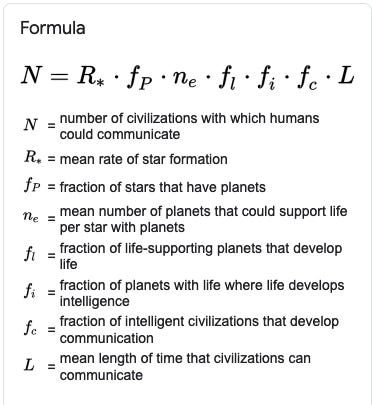28 Civilization
“Before our white brothers arrived to make us civilized men, we didn’t have any kind of prison. Because of this, we had no delinquents. Without a prison, there can be no delinquents. We had no locks nor keys and therefore among us there were no thieves. When someone was so poor that he couldn’t afford a horse, a tent or a blanket, he would, in that case, receive it all as a gift. We were too uncivilized to give great importance to private property. We didn’t know any kind of money and consequently, the value of a human being was not determined by his wealth. We had no written laws laid down, no lawyers, no politicians, therefore we were not able to cheat and swindle one another. We were really in bad shape before the white men arrived and I don’t know how to explain how we were able to manage without these fundamental things that (so they tell us) are so necessary for a civilized society.” - John (Fire) Lame Deer, Sioux Lakota - 1903-1976
28.1 Fermi Paradox and Drake Equation
Dessler
Enrico Fermi, one of the giants of 20th century physics, famously asked, “Where is everybody?” In this case, “everybody” referred to extraterrestrial aliens: given the vastness of the universe and long time it has existed, there should be advanced extraterrestrial civilizations throughout the universe. Why don’t we see any?
Enter the Drake Equation, devised by astronomer Frank Drake to put Fermi’s paradox on more quantitative grounds. It provided a framework on how to estimate how many active, communicative extraterrestrial civilizations there are in the Milky Way galaxy right now.
The approach is order-of-magnitude estimation at its best: break the desired quantity into the product of simpler terms, some that you can estimate and others that you can at least put a bound on. Here’s how Drake did it:

We can make educated guesses for each of these parameters:
R*: Recent estimates suggest about 2 new stars are formed in the Milky Way every year.
fP: Most stars have planets, so we’ll estimate this term to be 0.9.
Ne: This is speculative, but let’s assume 1 in 5 of stars with planets has a planet in the habitable zone, so this term is 0.2.
fl, fi, fc : These terms must be in the range zero to one, but beyond that no one has any idea, so let’s make a wild guess that they’re all equal to 0.1.
L: This is also unknown, but let’s assume that advanced civilizations last for ten million years.
Multiplying these terms together produces an estimate that there are 3,600 advanced civilizations in the Milky Way.
Note that N is proportional to L, the average lifespan of an advanced civilization. If, instead of 10,000,000 years, advanced civilizations last only 10,000 years, then N drops to 3.6 intelligent civilizations in the Milky Way.
And if advanced civilizations last on average only 1,000 years, then there would only be 0.36 of them in the Milky Way. Meaning we might be the only one. This could be the answer to Fermi’s Paradox.
What does this have to do with climate change? Climate change is the kind of test that civilizations have to pass if they want to last a long time. William Nordhaus, in his Nobel Prize acceptance speech, highlighted this reality by noting that:
Technological change raised humans out of Stone Age living standards. Climate change threatens, in the most extreme scenarios, to return us economically whence we came.
We are failing this test. And it’s not the only one: When a non-negligible fraction of society responds to a virus pandemic by eating horse paste instead of getting a safe and effective vaccine, it’s easy to see how it could all be over for humanity in a 1,000 years, if not sooner.
Thus, one plausible answer to Fermi’s question, “Where are they,” is that their own stupidity and greed killed them.
It’s conceivable that climate change is a threat that most civilizations need to deal with. Advanced civilizations civilizations inherently require energy, which initially might be sourced from the combustion of carbon-based materials. That would lead to the emission of greenhouse gases, which would lead to climate change. So perhaps, in climate change, we’re facing the same test that most or all advanced civilizations need to pass.
But climate change is just one challenge. We also need to deal with threats of nuclear war, pandemics, economists, and many potential disasters, all of which could knock humanity off its pedestal. If we fail any of those tests, then some future alien society might one day wonder where we are.
Dessler (2024) “Where is everybody?”: The Fermi Paradox, the Drake Equation, and climate change